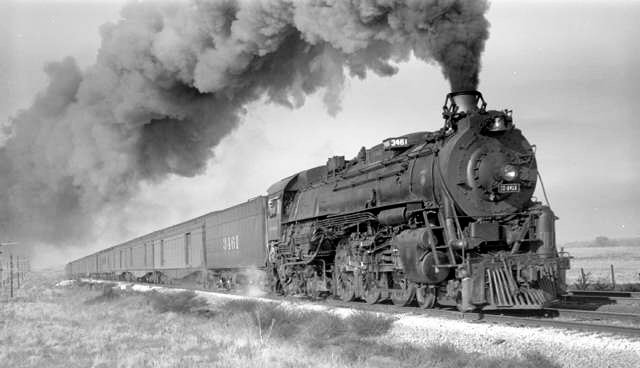- ATSF 3460 class
Infobox Locomotive
name = ATSF 3460 class
powertype = Steam
caption = ATSF 3460 class #3461 hauling Train #8, the Fast Mail Express (11 cars) at approx. 35 mph. Photographed east ofLa Junta, Colorado onSeptember 17 ,1939 byOtto Perry .
whytetype =4-6-4
uicclass = 2'C2'
builder =Baldwin Locomotive Works
builddate = 1937
totalproduction = 6
length = 54 ft 3¾ in (16.55 m) locomotive, 112 ft 7 in (34.31 m) with tender
height = 16 ft 8 in (5.08 m) over raised stack extension
width = 10 ft 9 in (3.28 m)
leadingsize = 37 in (940 mm)
driversize = 84 in (2134 mm)
trailingsize = 40 in (1016 mm)
boilerpressure = 300 psi (2.07 MPa)
cylindercount = 2
cylindersize = 23½×29½ in (597×749 mm)
wheelbase = 41 ft 1½ in (12.53 m)
gauge = 4 ft 8½ in (1435 mm)
weightondrivers = 211,400 lb (95,900 kg)
weight = 412,380 lb (187,100 kg)
locotenderweight = 712,500 lb (323,200 kg)
tractiveeffort = 49,300 lbf (219 kN)
factorofadhesion = 4.3
fueltype = oil
tenderc
firearea = 99.5 ft² (9.24 m²)
valvegear = Walschaerts
railroad =Atchison, Topeka and Santa Fe Railway
railroadclass = 3460 class
numinclass = 6
roadnumber = 3460–3465
disposition = 1 survivor, #3463, inTopeka, Kansas The
Atchison, Topeka and Santa Fe Railway 's 3460 class comprised six4-6-4 "Hudson" typesteam locomotive s built in 1937 by theBaldwin Locomotive Works for service betweenLa Junta, Colorado andChicago, Illinois , a fairly flat division of the railroad suited for the 4-6-4 type. They were substantially larger than the road's earlier 3450 class locomotives, and all were built oil-fired, although in a manner that would allow for easy conversion to coal firing.They had much in common with the
Milwaukee Road 's class F7 and theChicago and North Western Railway 's class E-4, all three types being fast, 84-inch drivered 4-6-4s for Midwestern service with 300 lb/in² boiler pressures.In December 1937, locomotive #3461 (pictured) set a world record for the longest single run by a steam locomotive by completing the 2227 miles from
Los Angeles, California to Chicago without maintenance other than five refuelling stops en route, hauling Train #8, the Fast Mail Express. An average speed of 45 mph was attained, including stops; maximum speed during the run was 90 mph. During steeply graded portions of the run it was, of course, assisted by helper locomotives. Such long distance runs were a goal of railway operating departments, enabling a reduction in locomotive numbers and through increased locomotive utilization, reduce overall costs.The first locomotive, #3460, was built
streamlined ; painted light, robin's egg blue and silver, it became known as the "Blue Goose". It was the Santa Fe's only streamlined locomotive, featuring extensively in railroad publicity and was a railfan favorite.Locomotive #3461 was fitted with a streamlined "skyline" casing along the top of the boiler, encasing stack and domes, in an experiment to see if it helped clear smoke away from the locomotive. It was not retained. All of the locomotives otherwise had a Santa Fe-style telescoping stack extension fitted, which elongated the stack to clear smoke better and could be lowered to pass under low bridges and tunnels.
The 3460 class 4-6-4s, the 3765 class
4-8-4 s, and the 5001 class2-10-4 s were designed and ordered around the same time and had much in common in their designs; in addition, they used the same six-axle tender design. The classes together were often called the "Big Three".One locomotive survives, #3463, on static exhibit in
Topeka, Kansas .References
*
* cite web
url = http://www.steamlocomotive.com/hudson/atsf.shtml
title = Atchison, Topeka & Santa Fe Hudsons
author = Barris, Wes
work = SteamLocomotive.com
accessdate = 2006-01-22
* cite book
title = Santa Fe Railway
author = Blaszak, Michael and Glischinski, Steve
year = 2002
id = ISBN 0-7603-0380-0
publisher = MBI
Wikimedia Foundation. 2010.

_oil,_20,000_US_gallons_(75,700_L)_water)